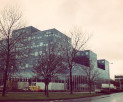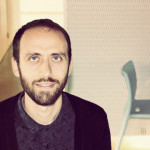Smart RUG system saves money and energy
Most of the visitors to the cafeteria of the Bernoulliborg at the Zernike Campus didn’t even know they had been in a living laboratory the past few months. PhD candidate Ilche Georgievski managed to reduce the energy consumption by 80 per cent with the aid of sensors.
‘Before, it was done by hand and the lights were on all day, from 6:30 in the morning until eight o’clock in the evening, and this while it is busiest during lunch. The rest of the day it is relatively quiet. The sensors measure movement and the natural light levels. Based on this information, it’s calculated which lamps should be on, and which ones can stay off.’
Georgievski had help in the canteen from PhD candidates Faris Nizamic and Tuan Ahn Nguyen, who had previously won a Green Mind award for their ideas to make the dining area at the Bernoulliborg ‘greener‘. The canteen system is one of the two main components of a larger experiment, which is in turn part of an even larger project: the EnSO-project (Energy Smart Offices), which is financed through the NWO and focuses on smart solutions to reducing energy usage in office spaces.
Special plugs
‘A refrigerator only cools for fifteen minutes once every hour’
Georgievski conducted another part of his research on the fifth floor, where he has his office. The Macedonian researcher found out how much power all the different appliances in the offices and common room consumed. He took this data to figure out how to minimise the power consumption. ‘Take a refrigerator, for instance. It only cools for fifteen minutes once every hour. The rest of the time, nothing happens, so it doesn’t need any power.’ Special power hubs were used to connect and disconnect the power.
Georgievski used the consumption data on appliances such as computers, printers, and the microwave in the common room, as well as data on the staff’s daily routine, to develop an intelligent system to manage the energy supply. He based it on the principle of free market competition among power suppliers, where energy has to be bought by the hour. ‘That’s still future talk right now, because people currently only have one power supplier. But in the future, with the emergence of green energy for example, it’s very possible that we’ll be able to take over power from our neighbours.’
Georgievski names the microwave in the common room as an example: ‘This is most used between noon and two o’clock in the afternoon. At this peak hour, power is at its most expensive. By shutting down the power supply to things such as charging laptops during these hours, peak hour consumption can be reduced. But you should still keep the refrigerator in mind, which needs fifteen minutes of power every hour.’
Boiler
‘I’d rather invest the time that would take in research’
Georgievski also discovered that the boiler at the Bernoulliborg continued heating the building overnight. ‘Turning the boiler off at night when nobody is in the building anyway saves approximately ten per cent in electricity.’ By using green energy, the system saved approximately 35 per cent in energy costs. But even without green energy, the total savings came to approximately 20 per cent, according to Georgievski.
In spite of all the positive results, the system on the fifth floor has been shut down. Georgievski says there is a logical explanation: ‘What if the system breaks down near the boiler? That problem would need a researcher to fix, not a mechanic. I’d rather invest the time that would take in research.’ The system in the cafeteria, however, will continue to operate.
Georgievski’s systems can easily be applied in other offices or in residences. ‘All you need is the right data. The algorithms do the rest.’ In the mean time, the research has been incorporated into a start up called ‘Sustainable Buildings’, which is being run by his colleagues Nguyen and Nizamic. ‘They are going to find out how they can perfect the heating of the Nieuwenhuis building’, according to Georgievski.






